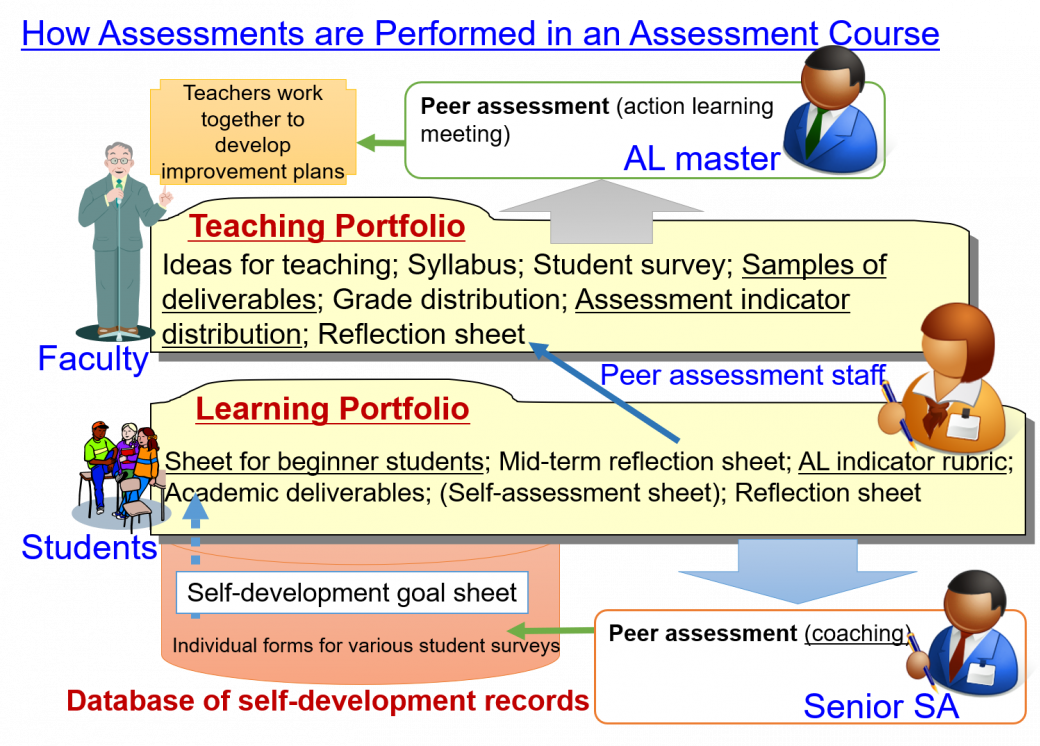- Acceleration Program for University Education Rebuilding (AP)
- Creating the culture of peer assessment
Creating the culture of peer assessment
Creating the culture of peer assessment
It takes courage to examine your own learning outcomes, or honestly evaluate your friend’s learning achievements. It takes wisdom to use various indicators for a correct assessment. It takes compassion to use your wisdom as you consider how your friend can grow, and to muster courage to talk about it. Courage, wisdom, and compassion are the three essential qualities in creative individuals that Soka University is committed to developing. Peer assessment for individual growth serves as the basic training that helps students become creative individuals.
Student peer assessment:
We train peer supporters (Senior SA) who lead peer assessments to provide students with opportunities to experience assessments in which students support each other in their growth processes. Students use AL indicator rubrics and other tools for peer assessment to examine their own learning outcomes, design the next learning activity, and write down their growth goals on a form. They also use the existing portfolio system to keep and accumulate their own self-development records, along with various student survey results. In doing so, they can refer to the records when they set their goals at the beginning of their next assessment course, and when they review their growth each year.
Peer review of teaching:
Soka faculty members work with their colleagues on teacher improvement plans using their class portfolios in action learning meetings designed to help solve problems. These action learning meetings center on the AL master discussed later. Peer reviews among colleagues offer faculty members opportunities to examine themselves and their teaching, thereby urging them to consider what they can do to help students achieve the learning outcomes required by their departments and the University. In this process, PASSs (students who have received assessment training) help collect information needed to design improvements, such as opinions and attitudes of students who have taken the course. Giving faculty members the opportunity for peer review to improve their teaching and help them raise their awareness of the importance of assessment, which speeds up the creation of the culture of growth-oriented peer assessment.
Student peer assessment:
We train peer supporters (Senior SA) who lead peer assessments to provide students with opportunities to experience assessments in which students support each other in their growth processes. Students use AL indicator rubrics and other tools for peer assessment to examine their own learning outcomes, design the next learning activity, and write down their growth goals on a form. They also use the existing portfolio system to keep and accumulate their own self-development records, along with various student survey results. In doing so, they can refer to the records when they set their goals at the beginning of their next assessment course, and when they review their growth each year.
Peer review of teaching:
Soka faculty members work with their colleagues on teacher improvement plans using their class portfolios in action learning meetings designed to help solve problems. These action learning meetings center on the AL master discussed later. Peer reviews among colleagues offer faculty members opportunities to examine themselves and their teaching, thereby urging them to consider what they can do to help students achieve the learning outcomes required by their departments and the University. In this process, PASSs (students who have received assessment training) help collect information needed to design improvements, such as opinions and attitudes of students who have taken the course. Giving faculty members the opportunity for peer review to improve their teaching and help them raise their awareness of the importance of assessment, which speeds up the creation of the culture of growth-oriented peer assessment.
